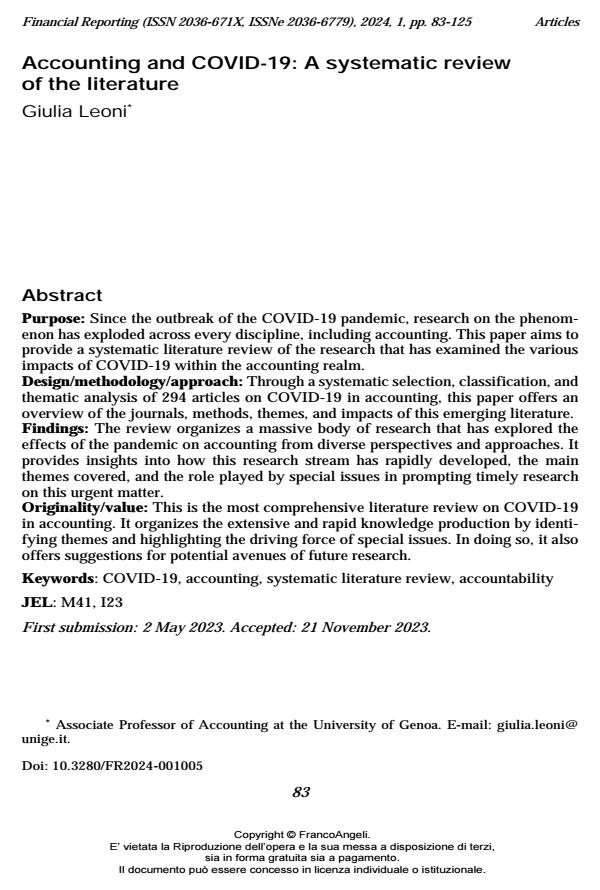Accounting and COVID-19: A systematic review of the literature
Titolo Rivista FINANCIAL REPORTING
Autori/Curatori Giulia Leoni
Anno di pubblicazione 2024 Fascicolo 2024/1
Lingua Inglese Numero pagine 43 P. 83-125 Dimensione file 368 KB
DOI 10.3280/FR2024-001005
Il DOI è il codice a barre della proprietà intellettuale: per saperne di più
clicca qui
Qui sotto puoi vedere in anteprima la prima pagina di questo articolo.
Se questo articolo ti interessa, lo puoi acquistare (e scaricare in formato pdf) seguendo le facili indicazioni per acquistare il download credit. Acquista Download Credits per scaricare questo Articolo in formato PDF

FrancoAngeli è membro della Publishers International Linking Association, Inc (PILA), associazione indipendente e non profit per facilitare (attraverso i servizi tecnologici implementati da CrossRef.org) l’accesso degli studiosi ai contenuti digitali nelle pubblicazioni professionali e scientifiche.
Purpose: Since the outbreak of the COVID-19 pandemic, research on the phe-nomenon has exploded across every discipline, including accounting. This paper aims to provide a systematic literature review of the research that has examined the various impacts of COVID-19 within the accounting realm. Design/methodology/approach: Through a systematic selection, classification, and thematic analysis of 294 articles on COVID-19 in accounting, this paper of-fers an overview of the journals, methods, themes, and impacts of this emerging literature. Findings: The review organizes a massive body of research that has explored the effects of the pandemic on accounting from diverse perspectives and approaches. It provides insights into how this research stream has rapidly developed, the main themes covered, and the role played by special issues in prompting timely research on this urgent matter. Originality/value: This is the most comprehensive literature review on COVID-19 in accounting. It organizes the extensive and rapid knowledge production by iden-tifying themes and highlighting the driving force of special issues. In doing so, it also offers suggestions for potential avenues of future research.
Parole chiave:COVID-19, accounting, systematic literature review, accountability
Jel codes:M41, I23
- Economic uncertainty and the acquisition of private companies in Europe Luca Viarengo, in FINANCIAL REPORTING 2/2025 pp.249
DOI: 10.3280/fr202519871 - Multivocal accountability in grand challenges: the Italian government’s response to COVID-19 between science and politics Alessandro Lai, Giulia Leoni, Riccardo Stacchezzini, in Accounting, Auditing & Accountability Journal /2025 pp.1919
DOI: 10.1108/AAAJ-06-2024-7139
Giulia Leoni, Accounting and COVID-19: A systematic review of the literature in "FINANCIAL REPORTING" 1/2024, pp 83-125, DOI: 10.3280/FR2024-001005